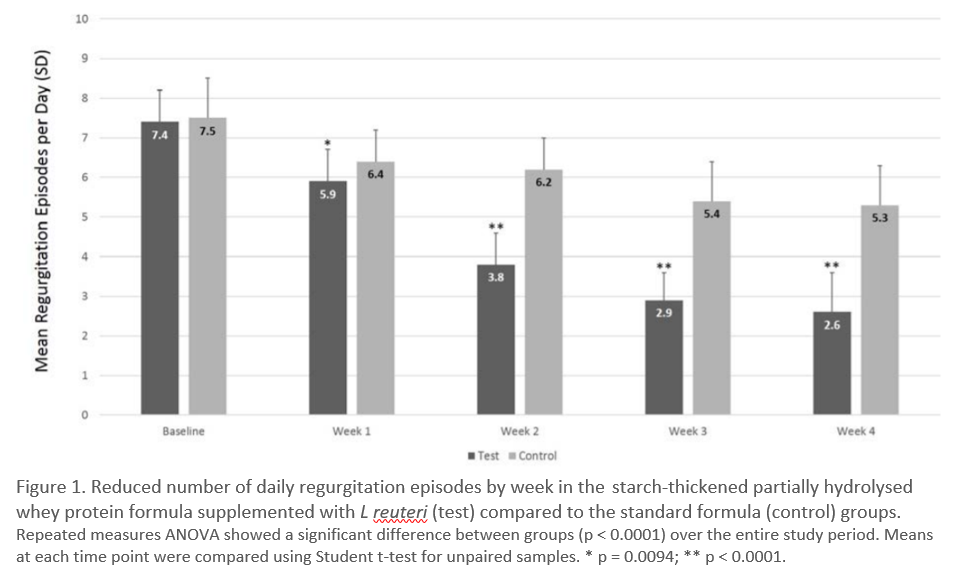Probiotics for functional gastrointestinal disorders
Functional gastrointestinal disorders (FGIDs) are common and refer to chronic and/or recurrent symptoms of the gastrointestinal tract that cannot be explained by structural or biochemical abnormalities. The pathophysiology of FGIDs is very complex and the diagnosis relies primarily on the symptom-based Rome criteria.[i] Among the most common FGIDs during the first few months of life are infantile colic, regurgitation and constipation.[ii] These FGIDs often lead to referral to a paediatrician during the first 6 months of life and are often responsible for hospitalisation, feeding changes, use of drugs, parental anxiety, and loss of parental working days with relevant social consequences.[iii] Infants with FGIDs have also been shown to be at an increased risk of developing abdominal pain, IBS and allergic disease later in life.[iv],[v]
Infantile colic is defined as recurrent or prolonged periods of crying, fussing or irritability in an infant who is <5 months of age, with no evidence of failure to thrive, fever or illness.3 Among the many dietary interventions that have been proposed to help treat colic, modifying the intestinal microbiome appears to have the most potential.
The gut microbiota
An analysis of the microbial DNA of >200 samples from 12 infants with colic and 12 age-matched control infants has established that the diversity of the intestinal microbiota in infants with colic was significantly lower than that of the control group. Additionally, Proteobacteria (including species producing gas and inflammation) were significantly increased in infants with colic compared with control infants. In contrast, bifidobacteria and lactobacilli (including species with anti-inflammatory effects) were significantly reduced in infants with colic.[vi] The results suggest that modulating the intestinal microflora through probiotics may be helpful in the management of infantile colic.
Probiotics in the management of colic
Lactobacillus reuteri is one of the probiotics that has been extensively investigated in well-designed clinical trials and systematic reviews. A 2018 meta-analysis provided solid evidence indicating that L reuteri is effective and can be recommended for breastfed infants with colic.[vii] More recently, it has also been demonstrated that an infant formula with partially hydrolysed protein, L reuteri and reduced lactose content alleviated digestive discomfort, including symptoms of infantile colic.[viii] Furthermore, L reuteri appears to confer a prophylactic effect: the use of L reuteri during the first 3 months of life has been shown to reduce the onset and costs associated with FGIDs.[ix]
Probiotics in the management of regurgitation
Oral supplementation with L reuteri stimulates gastric emptying in formula-fed infants, thus helping reduce the frequency of regurgitation.[x],[xi] It has also been demonstrated that compared to a standard formula, a starch-thickened partially hydrolysed whey protein formula supplemented with L reuteri is more effective in reducing the frequency of regurgitation and improving gastric emptying in infants with regurgitation (Figure 1).[xii] These data underscore that in addition to parental reassurance and the use of thickened formula, probiotic supplementation with L reuteri may represent another therapeutic option against functional regurgitation.
Probiotics in the management of functional constipation
Constipation is another FGID that commonly manifest during the first year of life. The administration of L reuteri in infants with chronic constipation had a positive effect on bowel frequency.[i] Moreover, a study has been shown that L reuteri had comparable effects as lactulose on bowel movements and faecal consistency in children with functional constipation.[ii] Limited available evidence suggests that L reuteri may play a role in the management of infants with functional constipation; more studies are needed before the routine use of L reuteri in the treatment and prevention functional constipation can be recommended.
Summary
Current evidence suggests that L reuteri may be effective in the prevention of some functional gastrointestinal disorders, such as colic and regurgitation. Preliminary data also suggest that L reuteri may be useful for treating functional constipation. However, more data is needed to recommend the routine use of L reuteri in the management of functional constipation.
[i] Coccorullo P, Strisciuglio C, Martinelli M, Miele E, Greco L, Staiano A. Lactobacillus reuteri (DSM 17938) in infants with functional chronic constipation: a double-blind, randomized, placebo-controlled study. J Pediatr. 2010 Oct;157(4):598-602.
[ii] Olgac MAB, Sezer OB, Özcay F. Comparison of probiotic and lactulose treatments in children with functional constipation and determination of the effects of constipation treatment on quality of life. Cocuk Sagligi ve Hastaliklari Dergisi [Turkish Pediatric Journal] 2013;56:1-7. (Abstract in English)
[i] Zeevenhooven J, Koppen IJ, Benninga MA. The New Rome IV Criteria for Functional Gastrointestinal Disorders in Infants and Toddlers. Pediatr Gastroenterol Hepatol Nutr. 2017 Mar;20(1):1-13.
[ii] Benninga MA, Faure C, Hyman PE, St James Roberts I, Schechter NL, Nurko S. Childhood Functional Gastrointestinal Disorders: Neonate/Toddler. Gastroenterology. 2016 Feb 15:S0016-5085(16)00182-7.
[iii] Indrio F, Di Mauro A, Riezzo G, Cavallo L, Francavilla R. Infantile colic, regurgitation, and constipation: an early traumatic insult in the development of functional gastrointestinal disorders in children? Eur J Pediatr. 2015 Jun;174(6):841-2.
[iv] Partty A, Kalliomaki M, Salminen S, Isolauri E. Infant Distress and Development of Functional Gastrointestinal Disorders in Childhood: Is There a Connection? JAMA Pediatr. 2013;167(10):977–978.
[v] Indrio F, Di Mauro A, Riezzo G, Cavallo L, Francavilla R. Infantile colic, regurgitation, and constipation: an early traumatic insult in the development of functional gastrointestinal disorders in children? Eur J Pediatr. 2015 Jun;174(6):841-2.
[vi] de Weerth C, Fuentes S, Puylaert P, de Vos WM. Intestinal microbiota of infants with colic: development and specific signatures. Pediatrics. 2013 Feb;131(2):e550-8.
[vii] Sung V, D'Amico F, Cabana MD, Chau K, Koren G, Savino F, Szajewska H, Deshpande G, Dupont C, Indrio F, Mentula S, Partty A, Tancredi D. Lactobacillus reuteri to Treat Infant Colic: A Meta-analysis. Pediatrics. 2018 Jan;141(1):e20171811.
[viii] https://program.m-anage.com/espghan2019/en-GB/ProgramSearch/DownloadAbstractOfPresentation/421348. Accessed Sept 2020.
[ix] Indrio F, Di Mauro A, Riezzo G, Civardi E, Intini C, Corvaglia L, Ballardini E, Bisceglia M, Cinquetti M, Brazzoduro E, Del Vecchio A, Tafuri S, Francavilla R. Prophylactic use of a probiotic in the prevention of colic, regurgitation, and functional constipation: a randomized clinical trial. JAMA Pediatr. 2014 Mar;168(3):228-33.
[x] Indrio F, Riezzo G, Raimondi F, Bisceglia M, Cavallo L, Francavilla R. Effects of probiotic and prebiotic on gastrointestinal motility in newborns. J Physiol Pharmacol. 2009 Dec;60 Suppl 6:27-31.
[xi] Indrio F, Riezzo G, Raimondi F, Bisceglia M, Filannino A, Cavallo L, Francavilla R. Lactobacillus reuteri accelerates gastric emptying and improves regurgitation in infants. Eur J Clin Invest. 2011 Apr;41(4):417-22.
[xii] Indrio F, Riezzo G, Giordano P, Ficarella M, Miolla MP, Martini S, Corvaglia L, Francavilla R. Effect of a Partially Hydrolysed Whey Infant Formula Supplemented with Starch and Lactobacillus reuteri DSM 17938 on Regurgitation and Gastric Motility. Nutrients. 2017 Oct 28;9(11):1181.
Click here to watch Prof Indrio’s speech on Probiotics for FGIDs
Click here to read highlights from Prof Aw’s speech on Common GI Woes in Infants
